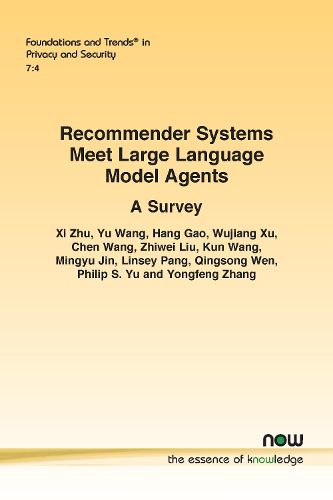Readings Newsletter
Become a Readings Member to make your shopping experience even easier.
Sign in or sign up for free!
You’re not far away from qualifying for FREE standard shipping within Australia
You’ve qualified for FREE standard shipping within Australia
The cart is loading…






This title is printed to order. This book may have been self-published. If so, we cannot guarantee the quality of the content. In the main most books will have gone through the editing process however some may not. We therefore suggest that you be aware of this before ordering this book. If in doubt check either the author or publisher’s details as we are unable to accept any returns unless they are faulty. Please contact us if you have any questions.
The integration of Large Language Models (LLM) and Recommender Systems (RS) has marked a transformative shift in how personalized recommendations are generated and delivered. Recommender systems, designed to predict user preferences and suggest relevant items, are ubiquitous in applications ranging from e-commerce to entertainment and social media. Historically, these systems have relied on techniques such as collaborative filtering, content-based filtering, and hybrid approaches. However, the advent of LLMs and AI agents has introduced new paradigms, significantly enhancing the capabilities and performance of recommender systems.
This monograph provides an extensive review of critical challenges, the current landscape, and future directions in the collaboration between LLM-based AI agents (LLM Agent) and recommender systems. The monograph begins with an introduction to the foundational knowledge, exploring the components of LLM agents and the applications of LLMs in recommender systems. It then delves into the symbiotic relationship between LLM agents and recommender systems, illustrating how LLM agents enhance recommender systems and how recommender systems support better LLM agents. Specifically, the overall architectures for designing LLM agents for recommendation are discussed, encompassing profile, memory, planning, and action components, along with multi-agent collaboration. Conversely, it investigates how recommender systems contribute to LLM agents, focusing on areas such as memory recommendation, plan recommendation, tool recommendation, agent recommendation, and personalized LLMs and LLM agents.
Furthermore, a critical evaluation is made of trustworthy AI agents and recommender systems, addressing key issues of safety, explainability, fairness, and privacy. Finally, potential future research directions are proposed, highlighting emerging trends and opportunities in the intersection of AI agents and recommender systems. This monograph concludes by summarizing the key insights of current research and outlining promising avenues for future exploration in this rapidly evolving field.
$9.00 standard shipping within Australia
FREE standard shipping within Australia for orders over $100.00
Express & International shipping calculated at checkout
Stock availability can be subject to change without notice. We recommend calling the shop or contacting our online team to check availability of low stock items. Please see our Shopping Online page for more details.
This title is printed to order. This book may have been self-published. If so, we cannot guarantee the quality of the content. In the main most books will have gone through the editing process however some may not. We therefore suggest that you be aware of this before ordering this book. If in doubt check either the author or publisher’s details as we are unable to accept any returns unless they are faulty. Please contact us if you have any questions.
The integration of Large Language Models (LLM) and Recommender Systems (RS) has marked a transformative shift in how personalized recommendations are generated and delivered. Recommender systems, designed to predict user preferences and suggest relevant items, are ubiquitous in applications ranging from e-commerce to entertainment and social media. Historically, these systems have relied on techniques such as collaborative filtering, content-based filtering, and hybrid approaches. However, the advent of LLMs and AI agents has introduced new paradigms, significantly enhancing the capabilities and performance of recommender systems.
This monograph provides an extensive review of critical challenges, the current landscape, and future directions in the collaboration between LLM-based AI agents (LLM Agent) and recommender systems. The monograph begins with an introduction to the foundational knowledge, exploring the components of LLM agents and the applications of LLMs in recommender systems. It then delves into the symbiotic relationship between LLM agents and recommender systems, illustrating how LLM agents enhance recommender systems and how recommender systems support better LLM agents. Specifically, the overall architectures for designing LLM agents for recommendation are discussed, encompassing profile, memory, planning, and action components, along with multi-agent collaboration. Conversely, it investigates how recommender systems contribute to LLM agents, focusing on areas such as memory recommendation, plan recommendation, tool recommendation, agent recommendation, and personalized LLMs and LLM agents.
Furthermore, a critical evaluation is made of trustworthy AI agents and recommender systems, addressing key issues of safety, explainability, fairness, and privacy. Finally, potential future research directions are proposed, highlighting emerging trends and opportunities in the intersection of AI agents and recommender systems. This monograph concludes by summarizing the key insights of current research and outlining promising avenues for future exploration in this rapidly evolving field.